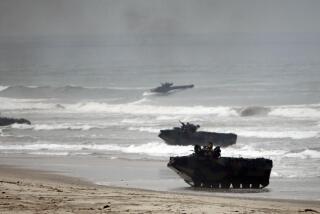When Convoys Are Attacked, Marines Will Hit Back
- Share via
CAMP PENDLETON — As they train for their return to Iraq, Marines are preparing to respond aggressively to Iraqi insurgents whose attacks on coalition convoys have become the major cause of casualties.
“The Marines are under no illusions: They’re going into a combat environment and their lives are at stake,” Capt. Reggie Gibbs, an assistant operations officer with the 1st Marine Expeditionary Force, said Friday at the end of a week of intense training that included classroom lectures and simulated attacks.
While other military organizations, including some units of the Army, believe the best strategy when a convoy is attacked is to speed out of range of enemy fire, Marine doctrine favors a quick and lethal counteroffensive.
On a nearly daily basis, insurgents are attacking U.S. convoys with rocket-propelled grenades, remote-controlled explosive devices and a variety of small arms. In response, military strategists are trying to improve the tactics and technology available to troops in the field.
Deputy Defense Secretary Paul D. Wolfowitz told congressional leaders in mid-October that he had redirected $335 million from the Defense Department’s $87-billion wartime supplementary budget to a variety of force-protection measures. “We need to aggressively pursue any and all new systems and technologies that will enhance security of our forces in the field,” Wolfowitz said.
Among those measures are more armored Humvees, more individual body armor, more counter-mortar radar, additional unmanned surveillance aircraft, and several kinds of high-tech systems to find and neutralize explosive devices placed along Iraqi roads.
Pentagon officials hope much of the new gear will be available within months, possibly by the planned rotation of forces early next year when, among other moves, 20,000 Marines from Camp Pendleton are set to relieve the Army’s 82nd Airborne Division.
With some units arriving and others departing, U.S. forces could be especially vulnerable as the number of convoys on Iraqi roads increases.
A joint survivability study group including Army, Marine Corps, Navy, Air Force and Special Forces Command officers has been ordered to find ways to reduce casualties.
Such studies often take years, but the joint survivability group has been ordered to have solutions within weeks. Top brass are to be briefed next week on the group’s progress.
“It’s the top priority of every senior officer I’ve been exposed to,” said Marine Lt. Col. David Wessner, the corps’ liaison to the survivability initiative. “We’ve got the capability to greatly reduce the effectiveness of [Iraqi ambushes] and we’ve got to do it.”
Although the U.S. military anticipated that the Iraqis would use ambush tactics on convoys during the war, officials have been surprised by the number, complexity and coordination of the attacks since President Bush on May 1 declared that major combat operations were over.
“We’re learning the hard way,” Wessner said from Marine Corps headquarters in Quantico, Va. “You need constant vigilance, and you need proper coordination and planning.”
Part of the answer, Wessner and others assert, lies not in technology but in better intelligence and a toughened attitude: making sure that every convoy has one or more attack vehicles with sufficient firepower, that every soldier or Marine is constantly scanning the horizon for threats, and that routes are scouted in advance by what are called “rat patrols.”
The problem of how to protect convoys is hardly new. Military historians have studied attacks on convoys in World Wars I and II, Korea, Vietnam, Somalia and Kosovo.
The moujahedeen forces in Afghanistan -- backed by the CIA -- repeatedly ambushed convoys during the Soviets’ occupation of that country in the 1980s. The destruction and demoralization wrought by the ambushes is considered a major factor in the Soviets’ defeat.
Although convoy protection has long been a standard part of pre-deployment training at Camp Pendleton, the current course includes several lessons tailored to what Marines can expect in Iraq, including tactics and explosives favored by the insurgents. Some of the changes in the training are classified as secret.
“This training is going to save lives,” said Lance Cpl. William Kinney IV.
More to Read
Sign up for Essential California
The most important California stories and recommendations in your inbox every morning.
You may occasionally receive promotional content from the Los Angeles Times.













